Related Research Articles
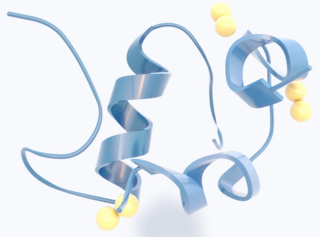
Insulin is a peptide hormone produced by beta cells of the pancreatic islets encoded in humans by the insulin (INS) gene. It is the main anabolic hormone of the body. It regulates the metabolism of carbohydrates, fats, and protein by promoting the absorption of glucose from the blood into cells of the liver, fat, and skeletal muscles. In these tissues the absorbed glucose is converted into either glycogen, via glycogenesis, or fats (triglycerides), via lipogenesis; in the liver, glucose is converted into both. Glucose production and secretion by the liver are strongly inhibited by high concentrations of insulin in the blood. Circulating insulin also affects the synthesis of proteins in a wide variety of tissues. It is thus an anabolic hormone, promoting the conversion of small molecules in the blood into large molecules in the cells. Low insulin in the blood has the opposite effect, promoting widespread catabolism, especially of reserve body fat.
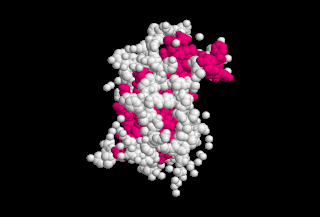
Growth hormone (GH) or somatotropin, also known as human growth hormone in its human form, is a peptide hormone that stimulates growth, cell reproduction, and cell regeneration in humans and other animals. It is thus important in human development. GH also stimulates production of insulin-like growth factor 1 (IGF-1) and increases the concentration of glucose and free fatty acids. It is a type of mitogen which is specific only to the receptors on certain types of cells. GH is a 191-amino acid, single-chain polypeptide that is synthesized, stored and secreted by somatotropic cells within the lateral wings of the anterior pituitary gland.
Genentech, Inc. is an American biotechnology corporation headquartered in South San Francisco, California, wholly owned by the Swiss multinational pharmaceutical company, the Roche Group. It became an independent subsidiary of Roche in 2009. Genentech Research and Early Development operates as an independent center within Roche. Historically, the company is regarded as the world's first biotechnology company.
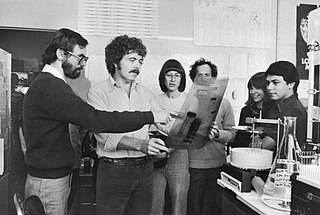
Herbert Wayne "Herb" Boyer is an American biotechnologist, researcher and entrepreneur in biotechnology. Along with Stanley N. Cohen and Paul Berg, he discovered recombinant DNA, a method to coax bacteria into producing foreign proteins, which aided in jump-starting the field of genetic engineering. By 1969, he had performed studies on a couple of restriction enzymes of E. coli with especially useful properties.
Growth hormone therapy refers to the use of growth hormone (GH) as a prescription medication—it is one form of hormone therapy. Growth hormone is a peptide hormone secreted by the pituitary gland that stimulates growth and cell reproduction. In the past, growth hormone was extracted from human pituitary glands. Growth hormone is now produced by recombinant DNA technology and is prescribed for a variety of reasons. GH therapy has been a focus of social and ethical controversies for 50 years.

Amgen Inc. is an American multinational biopharmaceutical company headquartered in Thousand Oaks, California. As one of the world's largest independent biotechnology companies, Amgen has approximately 24,000 staff in total as of 2022.
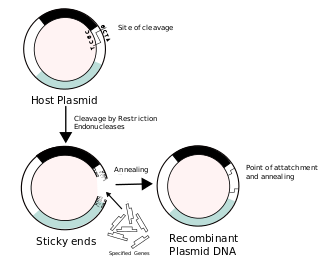
Recombinant DNA (rDNA) molecules are DNA molecules formed by laboratory methods of genetic recombination that bring together genetic material from multiple sources, creating sequences that would not otherwise be found in the genome.

John Shine is an Australian biochemist and molecular biologist. Shine and Lynn Dalgarno discovered a nucleotide sequence, called the Shine–Dalgarno sequence, necessary for the initiation of protein synthesis. He directed the Garvan Institute of Medical Research in Sydney from 1990 to 2011. From 2018 to 2022, Shine was President of the Australian Academy of Science.

Robert "Bob" Swanson (1947–1999) was an American venture capitalist who co-founded Genentech in 1976 with Herbert Boyer. Genentech is one of the leading biotechnology companies in the world. He was CEO of Genentech from 1976 to 1990, and chairman from 1990 to 1996.
Arthur Dale Riggs was an American geneticist who worked with Genentech to express the first artificial gene in bacteria. His work was critical to the modern biotechnology industry because it was the first use of molecular techniques in commercial production of drugs and enabled the large-scale manufacturing of protein drugs, including insulin. He was also a major factor in the origin of epigenetics.
Axel Ullrich is a German cancer researcher and has been the director of the molecular biology department at the Max Planck Institute of Biochemistry in Martinsried, Germany since 1988. This department's research has primarily focused on signal transduction. Ullrich has received Hamdan Award for Medical Research Excellence, awarded by Sheikh Hamdan bin Rashid Al Maktoum Award for Medical Sciences, Dubai, United Arab Emirates in 2008 and Ullrich and his team received the Wolf Prize in 2010.
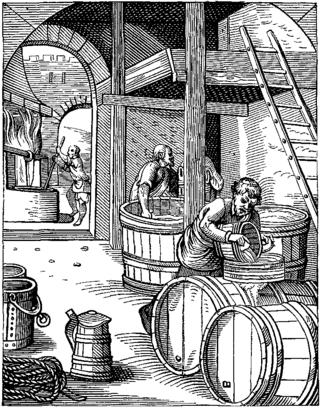
Biotechnology is the application of scientific and engineering principles to the processing of materials by biological agents to provide goods and services. From its inception, biotechnology has maintained a close relationship with society. Although now most often associated with the development of drugs, historically biotechnology has been principally associated with food, addressing such issues as malnutrition and famine. The history of biotechnology begins with zymotechnology, which commenced with a focus on brewing techniques for beer. By World War I, however, zymotechnology would expand to tackle larger industrial issues, and the potential of industrial fermentation gave rise to biotechnology. However, both the single-cell protein and gasohol projects failed to progress due to varying issues including public resistance, a changing economic scene, and shifts in political power.

Biotechnology is the use of living organisms to develop useful products. Biotechnology is often used in pharmaceutical manufacturing. Notable examples include the use of bacteria to produce things such as insulin or human growth hormone. Other examples include the use of transgenic pigs for the creation of hemoglobin in use of humans.

Relaxin/insulin-like family peptide receptor 1, also known as RXFP1, is a human G protein coupled receptor that is one of the relaxin receptors. It is a rhodopsin-like GPCR which is unusual in this class as it contains a large extracellular binding and signalling domain. Some reports suggest that RXFP1 forms homodimers, however the most recent evidence indicates that relaxin binds a non-homodimer of RXFP1.
Robert Tjian is a Hong Kong-born American biochemist best known for his work on eukaryotic transcription. He is currently professor of biochemistry and molecular biology at the University of California, Berkeley and an Investigator of the Howard Hughes Medical Institute (HHMI). On April 1, 2009, Tjian became the President of HHMI. On August 4, 2015, he announced that he would step down as President at the end of 2016.

Harvey Franklin Lodish is a molecular and cell biologist, professor at the Massachusetts Institute of Technology (MIT), Founding Member of the Whitehead Institute for Biomedical Research, and lead author of the textbook Molecular Cell Biology. Lodish's research focused on cell surface proteins and other important areas at the interface between molecular cell biology and medicine.
Keiichi Itakura is an organic chemist and a Professor in the Department of Molecular and Cellular Biology at the Beckman Research Institute at City of Hope National Medical Center.
James Allen Wells is a Professor of Pharmaceutical Chemistry and Cellular & Molecular Pharmacology at the University of California, San Francisco (UCSF) and a member of the National Academy of Sciences. He received his B.A. degrees in biochemistry and psychology from University of California, Berkeley in 1973 and a PhD in biochemistry from Washington State University with Ralph Yount, PhD in 1979. He completed his postdoctoral studies at Stanford University School of Medicine with George Stark in 1982. He is a pioneer in protein engineering, phage display, fragment-based lead discovery, cellular apoptosis, and the cell surface proteome.
Howard M. Goodman is an American molecular biologist and a professor of genetics emeritus at Massachusetts General Hospital. He is best known for his role in founding the department of molecular biology at Massachusetts General Hospital.
References
- 1 2 Eric W. Pfeiffer (1999-05-31). "Biotechnology All-Stars". Forbes . Archived from the original on 2012-02-06. Retrieved 2007-09-12.
- ↑ Invisible Frontiers: The Race to Synthesize a Human Gene by Stephen S. Hall (1987, Tempus Books of Microsoft Press)
- ↑ Amgen (2004-03-29). "Amgen to Acquire Tularik for $1.3 Billion". Amgen.
- ↑ Schwedelson, Paul (14 July 2016). "Goeddel brothers to finally meet when Phillies host the Mets". www.inquirer.com.